The study investigated how the Roman Catholic Church (RCC) governs the divergent Catholic cultural groups in the U.S. This study was historical in nature, longitudinal in scope, examined the relationship between the RCC and U.S. Catholic subcultures Spanish, French, Irish, German, Polish, Italians, and others. This study explored the multi-dimensional, vertical and horizontal, intra and inters processes that shaped the relationship between U.S. subcultures and the RCC. Results show that the nature of the governance relationship between RCC and the divergent U.S. Catholic subcultures was of a negotiated order. Governance varied depending on circumstances of the divergent subcultures in U.S. The RCC which is a global government is a confluence of cultural, socio-political, and theological ideologies of loosely coupled subcultures that subscribe to the Catholicism. And the implication is that leadership in the church entails learning how to negotiate one's clerical status and cultural affiliation because, whereas the church controls the production of clerics, the subculture will only accept a cleric who is cognizant of its cultural peculiarities.
Bitte wählen Sie Ihr Anliegen aus.
Rechnungen
Retourenschein anfordern
Bestellstatus
Storno








